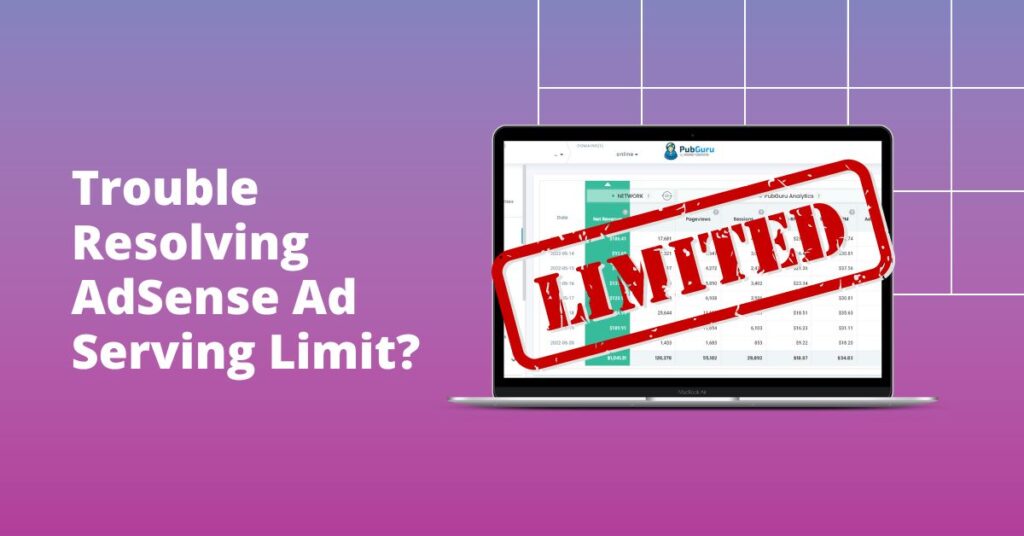One of the most prevalent AdSense issues that publishers face is having an ad-serving limitation imposed on their accounts. This penalty is disastrous for publishers as this literally limits their ability to serve ads on their sites which can heavily reduce AdSense revenues while the limitation is being enforced. You’ll see a notification about this in the AdSense Policy Center, and an email notification to explain what happened will also be sent to the email address/es associated with the account.
Oops! Why did I get an Ad Serving Limit Now?
Google has always been consistent in looking for ways to maintain a healthy digital advertising ecosystem among publishers, advertisers, and consumers by minimizing the occurrence of ad fraud and negative ad experiences in every way possible. The AdSense ad serving limit is in place to do exactly just that.
There are two primary reasons why your AdSense account got placed under such a penalty:
- Account Being Assessed: An ad serving limit can be placed on your account as a precautionary measure while your traffic quality is being assessed.
- Invalid Traffic Concerns: If Google determines that an account poses risks due to invalid traffic, an ad serving limit will also be imposed.
These are the official reasons provided by AdSense, but it’s important to note that other factors can also come into play and lead to an ad serving limit. For example, incorrect ad placements, improper ad labels, abusive ad refreshes, and ad stacking can all be contributing factors and must be fixed.
In all cases, the AdSense account will still be accessible. Unfortunately, AdSense does not provide a timeline on how long the review process will be. Still, publishers are advised to continue building quality content, fix potential ad serving and placement issues, and acquire traffic that’s free of potential IVT risks. The AdSense ad serving limit is then lifted automatically once the review process is done and Google has determined that the account does not currently pose any IVT concerns.
What Else Can Be Done to Expedite the Resolution?
While the review process can happen within an indeterminate amount of time, here are some tips that can help hasten the process and help you build a stronger case if you plan to appeal the ad serving limit to Google:
1- Replace bigger ad units with smaller ad sizes: Try pausing bigger-sized ad units with smaller ad sizes. This is especially recommended for ad units that are near navigation buttons and interactive site content. By using smaller sizes, the probability of invalid clicks can be reduced.
2-Implementing correct ad labels: The only ad labels permitted on Google ads are “Advertisements” and “Sponsored Links” and we recommend placing the ad labels on top of the ad instead of at the bottom. Do not use any other label variations that can mislead users into mistakenly clicking on ads on the site.
3-Temporarily pause desktop anchor: If using a sticky anchor ad either at the bottom or at the top, test pausing this ad unit while the ad serving limit is in place. Anchor ads can sometimes lead to invalid clicks depending on the website’s layout.
4-Add top and bottom margins on ads: Adding top and bottom margins through the use of CSS codes can help reduce the instances of accidental clicks.
Here’s an example:
<div style="margin-bottom: 30px;"><script type="text/javascript"> google_ad_client = "ca-pub-1234567890"; /* ad_728x90_atf */ google_ad_slot = "test_anchor_bottom"; google_ad_width = 728; google_ad_height = 90; </script> <script type="text/javascript" src="//pagead2.googlesyndication.com/pagead/show_ads.js"> </script> </div> |
These tips have already helped clear AdSense ad serving limitations on several publishers as fast as 24 hours after implementation!
On top of these tips, we strongly recommend using a two-time award winning invalid traffic solution such as Traffic Cop, which not only provides insights into a website’s traffic quality but also actively prevents ad fraud.
Aside from these features, Traffic Cop delivers additional preventative measures to combat common ad-serving mistakes such as ad stacking, hidden ad units, potential content policy violations, and abusive render occurrences. All this valuable, actionable data can be accessed in the Traffic Cop reporting suite found in the comprehensive PubGuru Ad Optimization Platform. This reporting suite is made available to publishers that sign up for a Traffic Cop subscription.
If an ad serving limitation is caused strictly by a surge in invalid traffic, signing up for IVT solutions can also help publishers build a stronger case when filing the AdSense Invalid Activity Appeal form.
Although account reinstatement is not necessarily guaranteed, showing that you’ve taken serious measures against combatting invalid traffic may improve your chances of getting the limitation lifted. Provide as much detail as possible in your appeal and highlight all the steps that you have taken to avoid the same issue from happening again. Interested in trying MonetizeMore’s award-winning invalid traffic solution? Sign up for a 7-day free trial of Traffic Cop today and start protecting your publishing business against the devastating consequences of invalid traffic attacks.
With over ten years at the forefront of programmatic advertising, Aleesha Jacob is a renowned Ad-Tech expert, blending innovative strategies with cutting-edge technology. Her insights have reshaped programmatic advertising, leading to groundbreaking campaigns and 10X ROI increases for publishers and global brands. She believes in setting new standards in dynamic ad targeting and optimization.
